Pigeons will eat any food waste they find including things like burgers, fries, pizza and anything discarded in the street.
Pigeons also commonly eat insects, bread, leaves, nuts, seeds, grains, fruit and vegetables.
The ideal diet for a pigeon should consist of seeds and grains.
A Healthy Pigeon Diet
To survive in a healthy condition, pigeons need proteins, fats, carbohydrates, vitamins, and minerals. Seeds and grains ideally should only constitute 50% of a pigeon’s diet.
They also need the nutrition that is obtained from fruits, berries, and insects.
Pigeons are known to be susceptible to calcium deficiency, owners of racing pigeon lofts or pet pigeons should be aware of this and give their birds the well-balanced diet that they need.
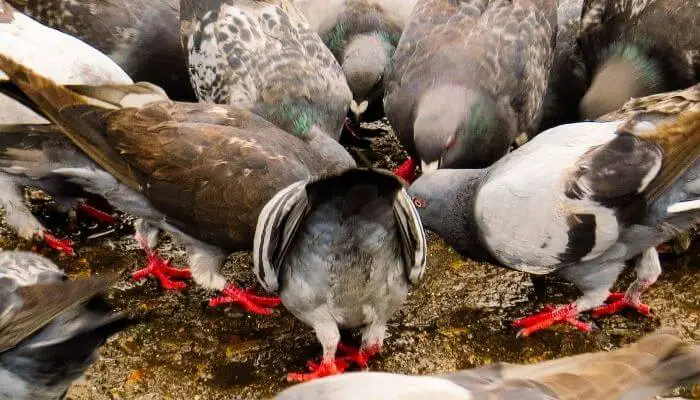
Feral pigeons have to fend for themselves and find whatever food resources they can.
It is doubtful that any of those have what can be considered a well-balanced diet.
For them, it is a question of both abundance and scarcity.
They may find an abundant source of food rich in some of the carbohydrates, proteins, fats, minerals, and vitamins that they need, but probably not the full nutritional range to maintain optimum health.
Unlike their captive brethren, the varied nutrients may come in fits and starts.
That is why there is a wide disparity of lifespan between pet and feral pigeons.
You can imagine that the lifespan of an urban pigeon is even shorter than that of its country cousins for this reason.
What To Feed A Pet Pigeon
There are plenty of commercially produced pigeon feeds with the correct nutritional balances to keep your pet pigeons healthy.
Although many pigeon owners may buy this kind of food, others would prefer to personally prepare the meals that they give their pets.
In that case, there is a wide variety of seeds that can easily be bought.
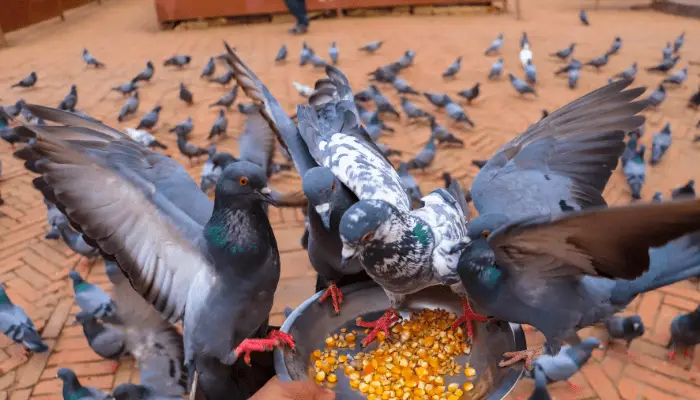
To be sure that your bird is getting the best possible range of nutrients mix different kinds of seeds together.
Each kind has its own properties.
It seems that pigeons can eat seeds from almost any flowering plant so that there is a great deal of choice.
Sunflower seeds are a great favorite because they are readily available, but others, such as Safflower are also a good choice.
If you want to take the alimentation of your pigeons a step further you can go to any rural or green area and harvest wildflower seeds.
Pigeons & Grains
Grains come in all types and are easy to find. The variety includes wheat, corn, barley, millet, rye, oats – essentially, anything that is classed as a cereal crop.
A mix of different types of seeds, plus a mix of different types of grain should make up only half your pigeon’s daily diet.
Chopped up vegetables are good to add too.
Almost anything that is naturally available will do, but it is better to use those kinds that don’t absorb a lot of water.
Pigeons are known to eat both spinach and peas.
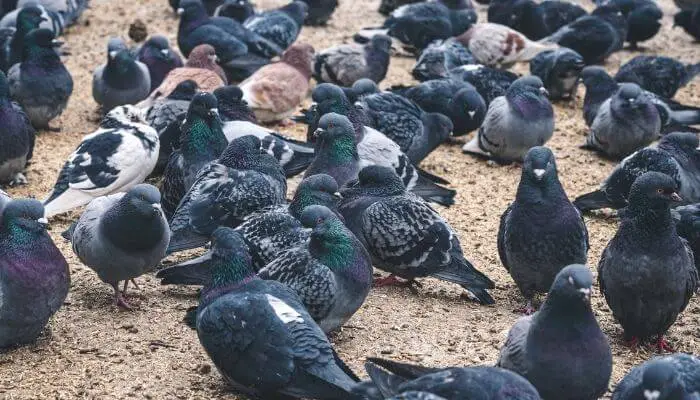
Fruits and berries will also add to a balanced diet.
Although pigeons aren’t known as great fruit eaters, they still do.
An easy supplement to their diet is apples, but don’t include the seeds as they aren’t good for pigeons.
Avocado is one of those exotic fruits that shouldn’t be given to your pet pigeon either. It contains a chemical called persin, which is toxic to pigeons.
Pigeons will eat the occasional insect as a meal too.
These provide protein for the birds, so the occasional bug of some kind can be put in their feed. It has been noted that brooding females are partial to snails and also slugs.
Vital Nutrients That Should Be Including In A Pigeons Diet
Pet pigeons should be given multivitamins and particularly, those that contain vitamin D3 and calcium.
Vitamin D3 is a substitute for the direct sunlight that they may not receive because they are indoor birds or spend much of their time in lofts.
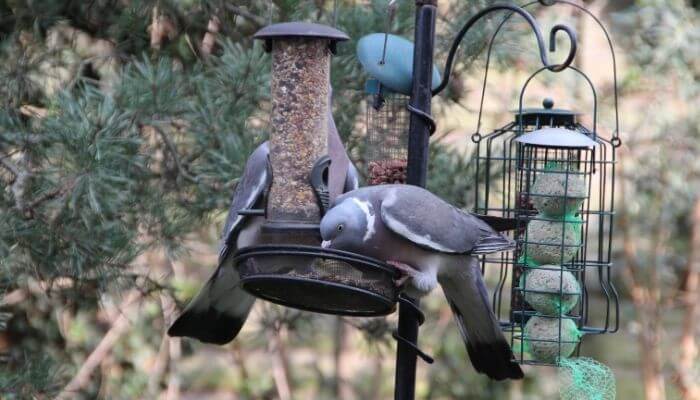
If they are deficient in vitamin D3 they can also have problems producing calcium. Without the vitamin D3, even if you include calcium supplements, it still may not be sufficient.
The result can lead to neurological problems, brittle bones, and the laying of eggs with soft shells.
Avoid an all-seed diet, as that leads to vitamin A deficiency.
Vitamin A helps the skin and membranes inside the pigeon’s body stay healthy, from the beak all through to the anus. Vitamin C is usually produced by pigeons in healthy quantities.
If your bird is weak for some reason, because of some ailment, would probably need to supplement vitamin C. Supplements of both vitamin E and K are advised too.
What Do Pigeons Eat In The City?
While pigeons should get their fill primarily from seeds and grains we all know that this is rarely true of city pigeons who will eat (pretty much) anything, some of the most common food choices for city pigeons are:
1. Throwaway Food
In almost every tourist site or place of interest, there’s usually some enterprising soul that is selling birdseed to feed the pigeons for a few pennies.
Historical sites, especially famous squares are usually littered with seed, thrown by gleeful children.
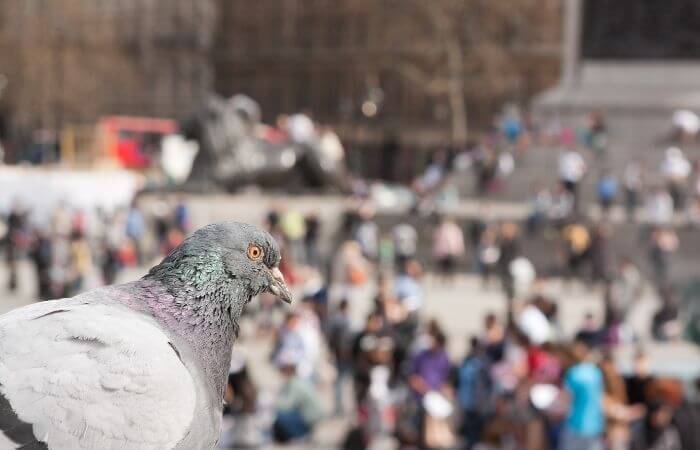
Seeds are the ideal food for a pigeon, but given the sheer numbers of pigeons that infest our cities, is that enough to feed all?
That is doubtful. So, what resources do those hungry pigeons turn to?
Human food waste of course.
Food that is dropped or thrown away.
Pavements and dustbins are buffets for pigeons.
2. Burger and Fries
Although omnivorous, which means they gobble up anything, pigeons can’t eat meat.
They don’t have teeth to grind it up into manageable pieces to digest.
As we all know, they do eat breadcrumbs, despite the fact that bread has no nutritional benefit for them.
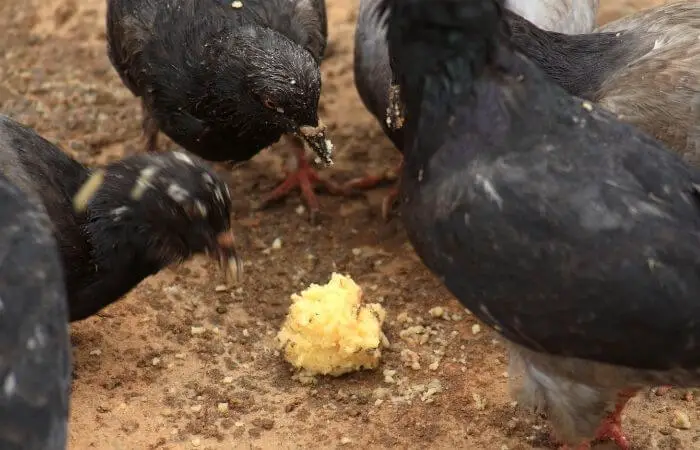
Burgers come with other goodies, not just a meat patty.
There’s lettuce, tomatoes and pickles.
With the increasing trend to eat fast food in our culture and the fashion of take-away food, it’s pretty clear that pigeons have easy access to it.
Imagine how many burgers are churned in one city per day. How much is inadvertently dropped?
How many half eaten meals are thrown in waste bins?
Supposedly, pigeons can’t eat fried food, but we’ve all seen them pecking away at abandoned French fries.
3. Pizza
Pizzas come with all sorts of toppings, not only meat.
There are vegetarian pizzas and all are sprinkled with different types of green ingredients.
A Hawaiian has pineapple.
Pigeons aren’t supposed to eat cooked food, but what about baked vegetables?
The base of a pizza is made of flour, a ground up grain mixed with water.
4. Kebabs
Apart from meat, kebabs are full of vegetable ingredients.
The pitta bread is of a much better nutritional benefit than a hamburger bun or most sandwich bread.
5. Chinese Food
The good old Chinese take-away has become an enduring favourite in our culture.
Chinese food is basically quick fried or boiled.
Forget about the fried ingredients and just think about the boiled food. Rice and noodles are all easily digestible.
What about all those shrimps and prawns? How many Chinese restaurants or take-aways can you find in the cities?
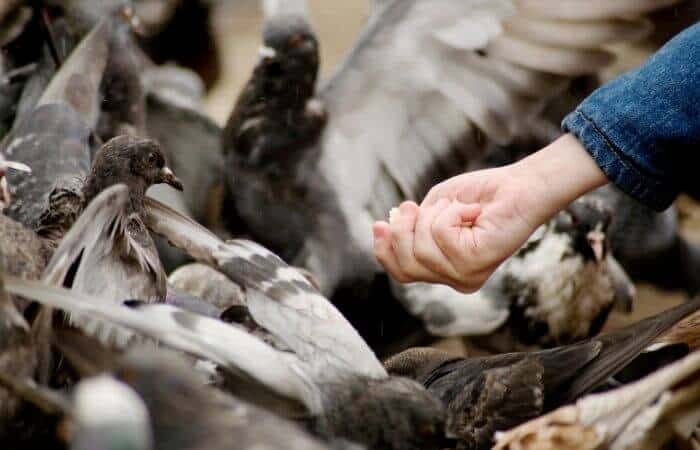
There has been an urban myth floating around for years that claims that pigeons can’t eat rice.
The premise is that because rice absorbs water the grains will expand in their tiny stomachs when they drink liquids.
Apparently, that will cause them to explode. Have you seen a lot of exploded pigeons lying around outside Chinese restaurants lately?
This is false, don’t believe it.
Indian food is similar, with many vegetarian and rice-based dishes.
6. Popcorn
It is said that pigeons are partial to popcorn also.
Aren’t we all?
You can just imagine a pair of pigeons winging their way down to the local cinema to check out the features.
If they are showing something popular, attracting a lot of film lovers, then it may be worth hanging around to scavenge all that dropped popcorn!
You can imagine that dropped ice-cream cones, wafers and biscuits will go down well too.
7. Kitchen Waste
Around the back of any type of restaurant or commercial catering concern there are left-overs and the remnants of chopped up fruit and vegetables.
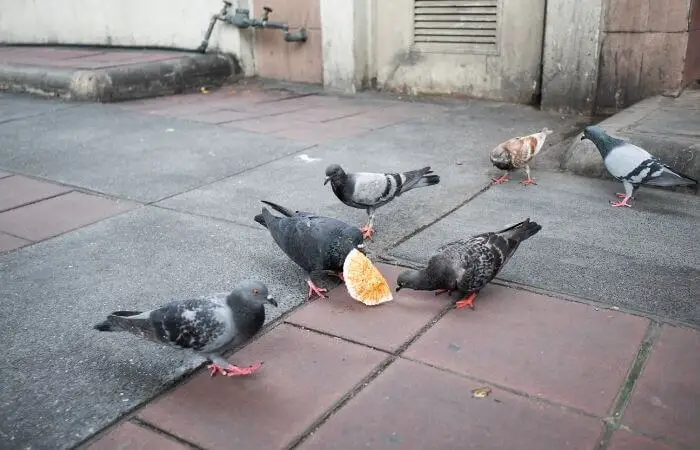
Not all will be nicely bagged up and put carefully in the bins.
What Do Pigeons Eat in the Wild?
The diet of wood pigeons is very different to that of city pigeons.
City pigeons have a man-made banquet while pigeons who live in the countryside are at the vagary of what Mother Nature provides, finding food for themselves.
They eat the food that nature has blessed them with.
This typically consists of:
- Seeds – grass seeds and wildflower seeds are abundant and may make up the bulk of their seed intake, but pigeons will eat any seed types they come across.
- Grains – This includes things like wheat, barley, corn and millet. This may be on farm land or growing in the wild.
- Fruits – particularly berries.
- Insects – such as worms, ants and spiders may supplement their diet.
What Do Pigeons Eat In Winter?
Urban pigeons eat much the same in winter as they do in warmer months.
Humans continually discard food whatever the weather so the supply for urban pigeons never dries up.
For rural pigeons, it’s not so simple.
Food sources are fewer and the pigeon’s diet will adapt accordingly.
Winter is usually a time of scarcity in the animal kingdom.
Pigeons have the same yearly struggle for survival as other species. As pigeons don’t migrate they face some tough months.
The pigeons that inhabit our cities are well catered for (as mentioned above)
They have adapted to modern urban living and are well versed in taking advantage of their opportunities.
Human activity doesn’t stop with the seasons; it is continuous all year round.
Winter may make things harder on those feral pigeons, but they are quite capable of surviving due to constant human production.
They survive during winter on a diet of made up primarily of seeds, nuts and insects. These can be harder to find during winter but there is generally enough to go around…if there isn’t then pigeons will move on to places where resources are a bit more plentiful.

This article was written by our qualified veterinarian Cristina.
This is part of our commitment to providing you with the most trustworthy veterinary advice for your pigeons.
Sources:
